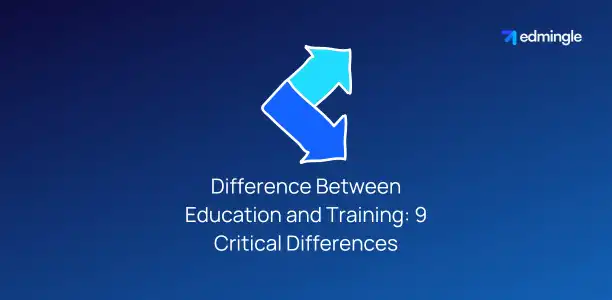
We have explored the difference between learning and training in our previous blog. Similarly, there’s a difference between education and training.
Both the terms are often used synonymously. But they hold distinctly different meanings and implications.
And knowing this distinction is key to delivering efficient programs. Aimed at both personal and professional development.
In this article, we’ll unravel the difference between education and training. Shedding light on how they diverge and intersect.
What is the Basic Difference Between Education and Training?
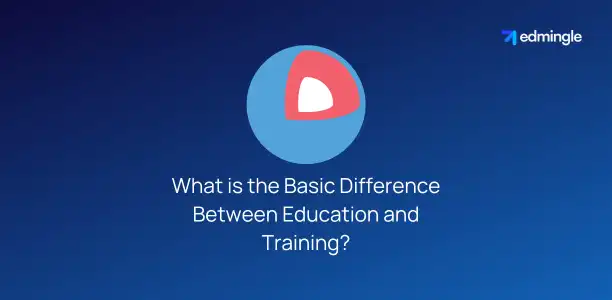
Education, in its broadest sense, is about learning. In a way that helps us understand our world and develop critical thinking.
It’s a journey through a rich landscape of theory, concepts & abstract knowledge. And is often without immediate practical application.
In contrast to that, training is more focused. Its typically aimed at teaching specific skills or competencies needed for a particular job or activity.
Why is Knowing the Difference Between Education and Training Important?
Despite the distinction, there’s one common thing. And that’s: overall development of an individual.
However, being aware of the differences in education vs training. Can result in more effective strategies towards achieving this unique goal.
Additionally, knowing the difference between training and education is important. Majorly for the following key reasons:
| 1.Career Planning and Development | Understanding these differences helps individuals make informed decisions about their career paths. The former often provides a broader knowledge base and critical thinking skills. Hence, its suitable for various roles and industries. Training, on the other hand, offers specific skills tailored to particular jobs or tasks. This is crucial for technical or vocational careers. |
| 2.Resource Allocation in Organizations | For small businesses, companies and educational institutions. This distinguishing ensures that resources are allocated efficiently. Where education is an investment in the long-term development of employees. Training is typically more directly linked to immediate job performance and productivity of employees. |
| 3.Personal Growth and Lifelong Learning | Recognizing the distinction allows individuals to balance their personal and professional growth. While the former nurtures a lifelong learning mindset, enhancing one’s understanding of the world. Training is often short-term and focused on practical skills and competencies. |
| 4.Effective Learning Strategies | Differentiating between both helps in selecting the most appropriate learning strategies. Education might require methods that encourage critical thinking and exploration. Whereas training might focus on hands-on experience and practice. |
| 5.Policy and Curriculum Development | In the context of academia and corporate training programs. Understanding these differences becomes more crucial. Majorly for developing effective curricula and policies. That meet the diverse needs of learners. While also aligning with organizational goals. |
In short. Recognizing the difference between education and training is vital for making strategic decisions.
Be it in career development, personal growth, organizational planning, or policy making.
What is Education?
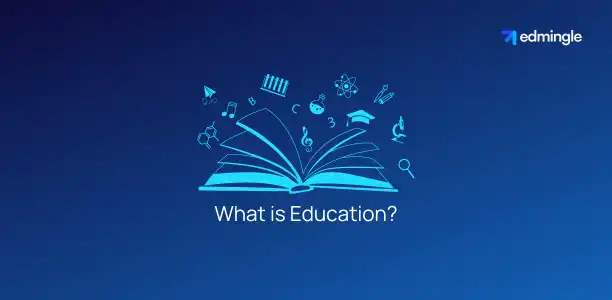
It is a broad process. That includes acquisition of knowledge, understanding, values, skills, and moral habits.
An enlightening experience. Focused on the holistic development of an individual. All while encouraging critical thinking, creativity, and personal growth.
Furthermore, its not confined to academic learning. But extends to understanding the world around us. And fostering intellectual and emotional maturity.
Key Points About Education
- Broad and Theoretical: It often covers a wide range of topics and theories. It provides a comprehensive understanding of subjects.
- Long-term Focus: It aims at long-term intellectual development. Added with the cultivation of a lifelong love for learning.
- Holistic Development: Focuses on the all-round development of an individual. This includes moral, emotional, and social aspects.
- Flexible and Exploratory: Encourages exploration, questioning, and understanding of various perspectives.
Types of Education
- Formal: A structured and systematic form. It includes primary, secondary, and tertiary.
- Informal: Learning that occurs outside formal institutions. For instance learning from family, peers, or self-study.
- Non-formal: Organized learning outside the formal system. This includes adult classes or community workshops.
What is Training?
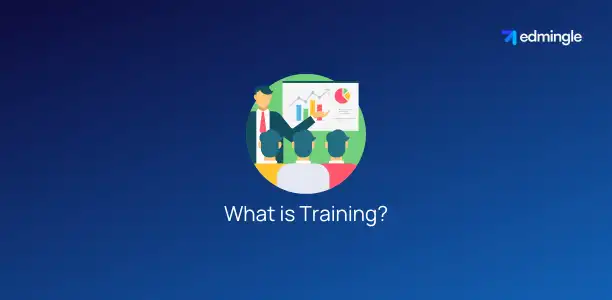
Training is a systematic process focused on developing specific skills or practical knowledge. Aimed at improving performance in a particular task or job.
It is often practical, job-specific. And focused on enhancing efficiency and effectiveness in a professional context.
Training is more about application than theory. Hence, making it an essential component for vocational or technical learning.
Key Points About Training
- Skill-Focused: Primarily a method of skill development. Centered around developing practical skills and competencies.
- Short-term and Goal-Oriented: Usually has a specific time frame with clear objectives. It’s often related to improving job performance.
- Hands-On Approach: Involves practical exercises and real-world application.
- Performance Measurement: The success is often measured by one’s ability to perform specific tasks/functions.
Types of Training
- On-the-Job Training: Practical training provided at the workplace while performing the actual job.
- Off-the-Job Training: Conducted outside the workplace, like workshops, seminars, or online courses.
- Vocational Training: Focused on acquiring skills for a particular trade or profession. Often provided by technical or vocational schools.
With this, we can now appreciate how education and training play distinct yet complementary roles. In personal and professional development.
9 Core Difference Between Training and Education (Education vs Training)
Education vs Training: The former broadens our horizons and builds a foundation for critical thinking. While training equips us with the necessary tools & skills to apply in specific scenarios.
In the table below, we list down the key differences between education and training.
| Aspect | Education | Training |
|---|---|---|
| Focus | Broad learning and intellectual development. | Specific skill development for a task/job. |
| Scope | Theoretical knowledge, comprehensive understanding. | Narrow scope, practical, job-related skills. |
| Goal | Long-term process of intellectual growth and critical thinking. | Short-term skill enhancement for better job performance. |
| Approach | Holistic, fostering overall development. | Focused, task-oriented. |
| Duration | Generally long-term and ongoing. | Often short-term, duration-specific. |
| Methodology | More exploratory, encouraging questioning and understanding. | Hands-on, practical application of skills. |
| Evaluation | Based on understanding, critical analysis, and knowledge. | Based on performance and skill proficiency. |
| Examples | Degree programs, liberal arts. | Workshops, vocational training, employee on-the-job training. |
| Outcome | Knowledge, critical thinking, and moral development. | Enhanced job performance, specific skill acquisition. |
This table clearly draws the line how each serves a unique purpose.
Summary on Education vs Training
In conclusion. Both education and training are distinct. And yet somehow interrelated in shaping both personal and professional landscapes.
While the former casts a wide net, training zeroes in on specific skill sets.
This understanding is not just academic. But instrumental in guiding individuals and organizations. Towards more targeted and effective learning strategies.
By appreciating the differences between education and training and where they intersect. We can better navigate our paths.
FAQs on Differences Between Training and Education
1.Can someone receive education and training simultaneously?
Absolutely. Many programs incorporate elements of effective training. Particularly in fields where practical skills are essential. For instance, medical learning. It includes both comprehensive theoretical learning and practical training in clinical skills.
2.Can training be considered a part of education?
Yes. Particularly in the context of vocational or technical education. Where specific skills are taught as a part of a broader curriculum.
3.Is education more important than training?
Neither is inherently more important; they serve different purposes. Education is beneficial for a wide range of professions and life in general. Training, on the other hand, is essential for acquiring specific skills.
4.How do the methodologies of education and training differ?
Traditional education methodologies often involve exploratory and theoretical learning. Encouraging questioning and a deep understanding of subjects. Training methodologies are more practical. Focusing on hands-on skills and direct application of knowledge in specific scenarios.
5.Is online learning considered education or training?
Online learning can be both. Depending on the nature of the course. If the course is aimed at broad knowledge and theoretical understanding, it’s traditional education. If it’s focused on specific skills or tasks, such as coding bootcamps, it’s considered training.
6.Can training lead to personal growth similar to traditional education?
Yes, training can contribute to personal growth. Especially in terms of building confidence, honing specific skills, and improving job performance.
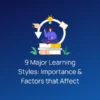


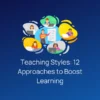


Leave a Reply